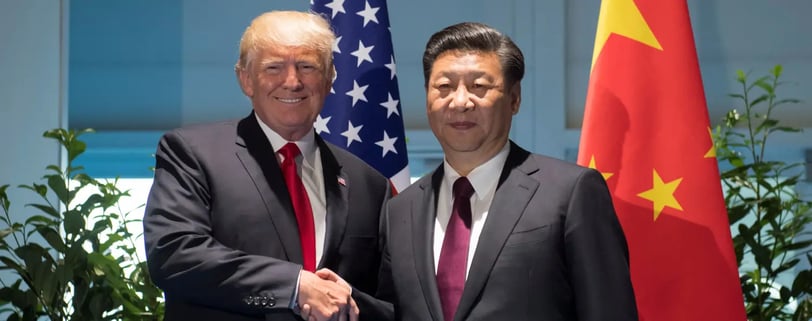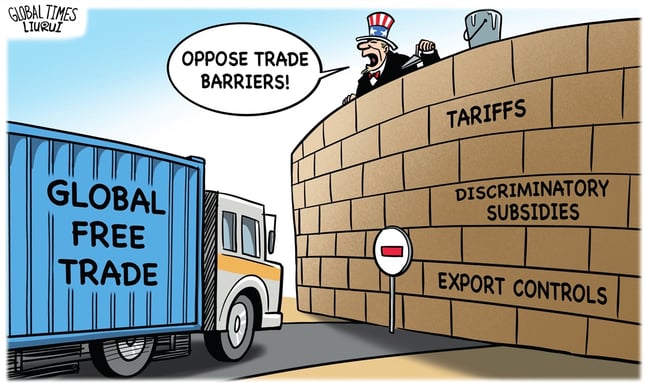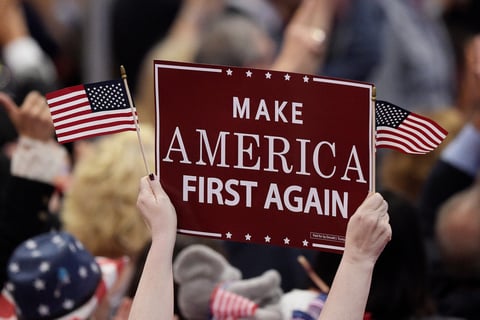Tariffs, Security and Trade Wars
Recent statements by President Trump regarding tariffs have sparked heated debate over what these policies could mean for the U.S. economy and the cost of living for average Americans.
INTERNATIONAL RELATIONSINTERNATIONAL TRADENEWS ARTICLE
Evaristo Joaquin Gonzalez Montepeloso
11/28/2024


Recently, President Trump mentioned the possibility of introducing 25% tariffs on goods from Mexico and Canada, and 10% tariffs on goods coming from China. Although tariffs have historically been a central policy in protecting local industries, as will be explored later, the president-elect stated that these duties were aimed at reducing the flow of drugs and illegal immigration into the country.
But what is a tariff, and how will it impact the cost of living for average American families?
A tariff is a type of trade barrier imposed by countries that causes the price of imported products to rise, making them relatively more expensive compared to domestic products. These duties are payments made by importers at the moment a product enters the country and are eventually passed on to end consumers. Although other forms of non-tariff trade barriers exist, such as import licenses or quotas, tariffs are the most direct way to boost local product demand and signal the desired intent to other governments.
President Trump already has experience with tariffs, as during his first administration he implemented the so-called "Trump Tariffs," a series of tariffs imposed on China as part of the "America First" economic policy aimed at reducing the United States' trade deficit by shifting American trade policy from multilateral free trade agreements to bilateral trade deals.
As we can see in Trump's statement, the focus was not so much on protecting local industries—although he has touched on this topic as well—but rather on using tariffs as a political bargaining chip to address other problems that the Trump administration and the Republican agenda have prioritized for the coming years. This is a crucial topic many news outlets have failed to address, because when covering the concept of tariffs, they have focused primarily on their role as an economic policy. However, we should think of tariffs as being no different from economic sanctions imposed on countries like North Korea or Iran for actions deemed unacceptable. Likewise, President Trump seeks to use tariffs to pressure the Mexican government to strengthen its efforts in the "War on Drugs," control the flow of migrants, and dismantle migrant caravans heading for the border.
What was the response of the affected countries to Trump's statements?


This political cartoon by the Global Times showcases the negative sentiment many people have today towards tariffs and trade barriers, viewing them as hindrances to global progress and somewhat self-centered.
Canada's Prime Minister Justin Trudeau said his country was prepared to work with the U.S. in "constructive ways" and stated, "This is a relationship that we know takes a certain amount of working on, and that's what we'll do," appearing cooperative in the face of Trump's policies. This sentiment was reinforced in his speech in the House of Commons, where he said, "The idea of going to war with the United States isn’t what anyone wants." This makes sense, considering Canada sends 75% of its exports to the U.S. However, in quite a different tone, the leaders of Canadian provinces suggested they would impose their own tariffs on the U.S., highlighting a clear political division between the federal and provincial governments.
President Sheinbaum, Mexico's head of state, gave a more direct response to Trump's statements, saying that they would retaliate by imposing their own taxes on U.S. imports, which would "put common enterprises at risk." She argued that neither threats nor tariffs would solve the migration phenomenon or drug consumption in the U.S. This response seems off-putting, as, like Canada, Mexico heavily relies on the United States as its most important trade partner, particularly in exports, meaning a trade war would hurt Mexico more than it would hurt the U.S. However, despite this apparent tough stance, Sheinbaum has stated that "Mexico has taken steps to tackle illegal migration into the U.S." and that "caravans of migrants no longer reach the border," which may help Trump's case of using the mere threat of tariffs as a motivator to address his security concerns with their southern neighbor.
China, through its spokesperson at the embassy in Washington, D.C., states, "No one will win a trade war or a tariff war," because "China-U.S. economic and trade cooperation is mutually beneficial in nature." These statements show signs of cooperation but also carry an underlying message that the United States should avoid the path of trade wars. This could be seen as a Mutually Assured Destruction (MAD) situation, in the sense that an all-out trade war with China could lead to significantly higher living costs in the highly consumerist American society, along with a massive loss of revenue for Chinese manufacturers due to decreased sales from their single biggest trade partner.


This issue will certainly remain relevant in the coming months, especially after President Trump is sworn into office. While it is difficult to predict what will happen next, it is fair to assume that Trump's policies will be shaped by the actions of his neighbors and partners, particularly regarding his demands for increased security and migration control.
Sources
ABC7. (2024, November 28). Trump threatens to impose sweeping new tariffs on Day 1 [Video]. YouTube. https://www.youtube.com/watch?v=zq91qEDE5Sc
FitzGerald, J., Yousif, N., & Matza, M. (2024, November 28). 'No-one will win' - Canada, Mexico and China respond to Trump tariff threats. BBC News. https://www.bbc.com/news/articles/cj6kj2752jlo
Kortunov, A. (2024, June 30). High tariffs won’t fix US' structural disorders. Global Times. https://www.globaltimes.cn/page/202406/1315109.shtml
Radcliffe, B. (2024, June 26). The basics of tariffs and trade barriers. Investopedia. https://www.investopedia.com/articles/economics/08/tariff-trade-barrier-basics.asp#toc-non-tariff-barriers-to-trade
Wikipedia. (n.d.). Trump tariffs. Wikipedia. https://en.wikipedia.org/wiki/Trump_tariffs
